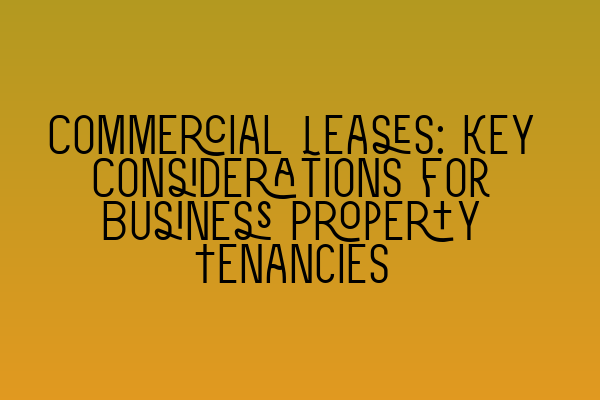**Commercial Leases: Key Considerations for Business Property Tenancies**
As a business owner, entering into a commercial lease is a significant step towards establishing your presence in the market. It is crucial to ensure that you have a thorough understanding of the key considerations involved in a business property tenancy to protect your interests and avoid potential pitfalls. In this article, we will explore the essential aspects of commercial leases and provide valuable insights to guide you through the process.
**1. **Location: **One of the first factors you should consider when entering into a commercial lease is the location of the premises. The success of your business may depend on factors such as accessibility, footfall, and proximity to potential customers or suppliers. Conduct thorough research and visit the property in person to assess its suitability for your business needs. Remember, a strategic location can significantly impact the performance of your business.
**2. Lease Term: **The lease term refers to the duration for which you will possess the premises. It is crucial to negotiate a lease term that aligns with your business plans. Long-term leases are generally more favorable as they provide stability and allow you to establish your business. However, if you are uncertain about your future plans or are testing a new market, a shorter lease term may be more appropriate. Ensure that the lease term provides you with the flexibility you need without compromising on the security of tenure.
**3. Rent and Rent Review: **The rent is a fundamental aspect of any commercial lease. It is vital to agree upon a rent that fits within your budget and is reflective of the market value of the property. Additionally, consider the rent review provisions stated in the lease. Rent reviews typically occur at regular intervals and allow for adjustments in line with market conditions. Ensure that the rent review mechanism is fair and takes into account any potential changes in your business’s financial circumstances.
**4. Use and Permitted Alterations: **The permitted use clause specifies the activities permitted on the premises. It is crucial to ensure that the permitted use aligns with your business activities to prevent any legal complications. Additionally, consider the scope for alterations and improvements. Will you require the landlord’s consent for any alterations? It is essential to clarify these provisions before signing the lease.
**5. Repairs and Maintenance: **Understanding your repair and maintenance obligations is crucial to ensure the premises are kept in good condition. Commercial leases typically allocate these responsibilities between the landlord and tenant. It is vital to review the repair obligations and determine who is responsible for what. Ensure that the terms are reasonable and manageable for your business.
**6. Break Clause: **A break clause provides the flexibility to terminate the lease before its expiration. This can be advantageous if you anticipate changes in your business requirements or if the premises no longer meet your needs. Pay close attention to the break clause conditions, such as the notice period and any associated costs. Consulting with a solicitor can help you fully understand the implications of exercising the break clause.
**7. Alienation: **Alienation provisions refer to the ability to transfer or assign the lease to another party. This can be crucial if you wish to sell your business or sublet the premises. It is essential to review the alienation provisions and understand any restrictions or requirements involved. Ensure that the lease provides sufficient flexibility to accommodate any potential changes within your business.
In conclusion, negotiating a commercial lease requires careful consideration of various aspects to ensure that the terms align with your business requirements. From the location to the lease term, rent and rent review, use and alterations, repairs and maintenance, break clauses, and alienation provisions, each aspect plays a significant role in securing a favorable tenancy agreement.
If you need further guidance or assistance, SQE Property Law & Land Law are experts in providing professional legal advice and representation for commercial lease matters. Contact us today to schedule a consultation and discuss your specific needs.
Related Articles:
– SQE 1 Practice Exam Questions
– SQE 1 Practice Mocks FLK1 FLK2
– SQE 2 Preparation Courses
– SQE 1 Preparation Courses
– SRA SQE Exam Dates
